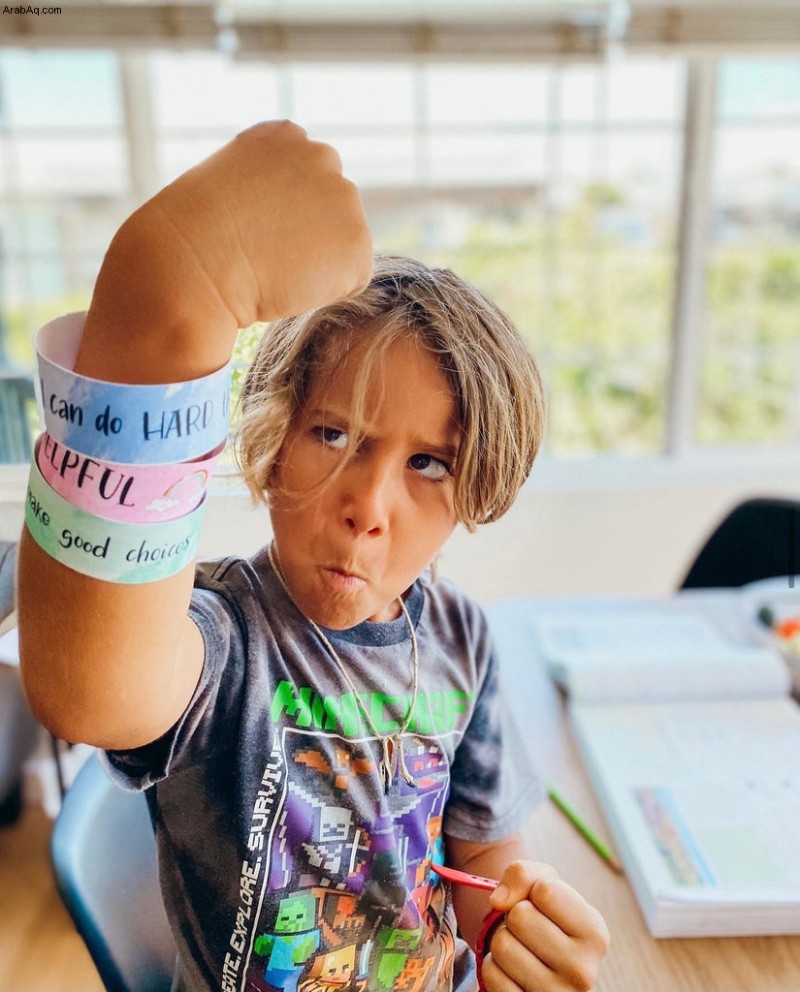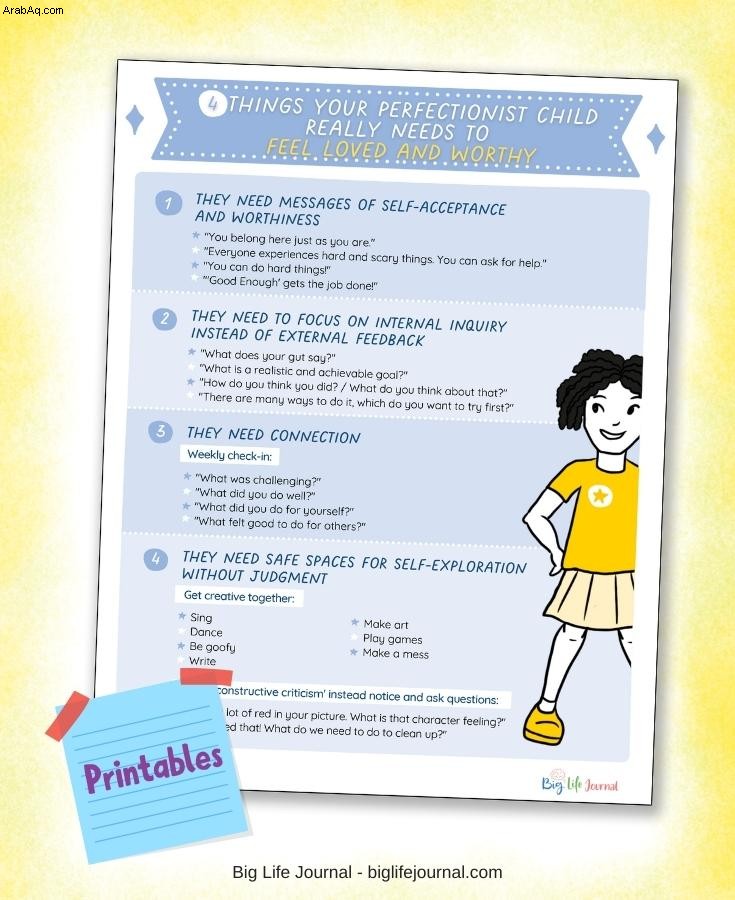وما هو العامل الأساسي في تنمية ثقة الطفل؟
أنت! والدي الطفل والمعلمين.
لا ضغط ، أليس كذلك؟ لا تقلق - بناء ثقة الطفل لا يجب أن يكون مهمة مخيفة أو معقدة.
في الواقع ، يمكنك جعلها ممتعة!
استخدم 25 قائمة على البحث ، استراتيجيات فعالة لبدء تعزيز ثقة أطفالك أو طلابك اليوم.
قبل المتابعة ، اعتقدنا أنك قد ترغب في تنزيل موقعنا المجاني تحدي الحب الذاتي لمدة 5 أيام للأطفال (من سن 5-11). ستساعد هذه التمارين الإبداعية المستندة إلى العلم طفلك على تدريب دماغه ليصبح أكثر حبًا للذات وثقة بالنفس وقادرًا على التعامل مع التحديات والنكسات.
1. تأكد من أنهم يعرفون أن حبك غير مشروط.
الطريقة التي نرى بها أطفالنا (أو الطريقة التي يؤمن بها أطفالنا نراهم) له تأثير عميق على الطريقة التي يرون أنفسهم بها.
أوضح لأطفالك (أو لطلابك) أنك تحبهم وتهتم بهم حتى عندما يرتكبون أخطاء أو قرارات سيئة ، وتجنب انتقادهم بشدة أو فضحهم.
2. تدرب على الحديث الإيجابي مع النفس معهم.
غالبًا ما ينخرط كل من الأطفال والبالغين في محادثات سلبية ومضرة مع أنفسهم:"لا يمكنني القيام بذلك" أو "أنا فظيع في __________" أو "ما خطبي؟"
قدّم نماذج للتأكيدات الإيجابية وعلّمها للأطفال باستخدام موقعنا الشهير و المجاني نشاط اساور التأكيد

3. خاطبهم بأسمائهم.
تعتبر مخاطبة الأطفال بالاسم طريقة فعالة وبسيطة لإرسال رسالة تفيد بأنهم مهمون ، خاصة عند إقرانها بالتواصل البصري الودي.
4. امنحهم "مهام خاصة" مناسبة لأعمارهم لمساعدتك.
بالإضافة إلى الأعمال المنزلية والوظائف الصفية ، امنح الأطفال "مهام خاصة" لمساعدتهم على الشعور بالفائدة والمسؤولية والكفاءة. يؤدي استخدام كلمة "خاص" إلى زيادة ثقة الأطفال بشكل أكبر.
في المنزل ، يمكن أن تشمل هذه المهام الخاصة المساعدة في رعاية حيوان أليف أو أخ أصغر حسب الحاجة ، أو أن تكون "مساعدًا" في الطهي ، أو مجرد ارتداء ملابس خاصة لطفل صغير جدًا.
في حجرة الدراسة ، يمكن للأطفال المساعدة في تزيين الفصول الدراسية ، وسقي النباتات ، ومحو السبورة ، وما إلى ذلك.
5. انضم إلى لعبهم (ودعهم يقودون اللعبة).
يرسل الانضمام إلى مسرحية طفل رسالة مفادها أنه مهم ويستحق وقتك.
أثناء وقت اللعب ، يمكن للوالدين السماح للأطفال ببدء النشاط أو اختياره ، بالإضافة إلى قيادته. عندما ينخرط الوالدان في نشاط بقيادة الطفل ويبدو أنهما يستمتعان به ، يشعر الطفل بقيمة وإنجازه.
يمكن لمعلمي الأطفال الصغار تنفيذ هذه الإستراتيجية في الفصل أيضًا.
6. ركز على تحسين ثقتك بنفسك.
هذه ليست خطوة يمكنك إنجازها بين عشية وضحاها ، لكنها واحدة من أكثر الخطوات أهمية في هذه القائمة.
الآباء هم القدوة الأولى والأفضل للطفل ، لذا خصص بعض الوقت لإصلاح ثقتك بنفسك إذا لزم الأمر. ابدأ بإبداء تعليقات إيجابية عنك وعن الآخرين في وجود طفلك.
يجب أن يتجنب المعلمون أيضًا النقد الذاتي وأن يكونوا نموذجًا للثقة أمام طلابهم.
7. اطلب منهم نصيحتهم أو آرائهم.
اطلب من الأطفال نصيحتهم أو آرائهم حول المواقف المناسبة لأعمارهم لإظهار أنك تقدرهم وتقدر أفكارهم.
يساعد هذا أيضًا الأطفال في بناء الثقة من خلال إظهار أنه حتى البالغين يحتاجون إلى المساعدة أحيانًا ، ولا بأس في طلبها.
8. خصص وقتًا خاصًا معًا.
الحب والقبول عنصران أساسيان للثقة وتقدير الذات ، لذلك يجب على الآباء قضاء وقت ممتع مع أطفالهم لإثبات قيمتهم.
اصطحبه في نزهات ، أو تناول العشاء معًا ، أو لعب الألعاب ، أو الخروج إلى الخارج ، أو القيام بأي نشاط آخر يسمح لك ولطفلك بالاستمتاع بالوقت معًا.
يمكن للمدرسين مساعدة الأطفال على الشعور بالحب والقبول من خلال التعرف على اهتمامات الطلاب أو هواياتهم والتركيز على إجراء محادثات مخصصة مع كل طفل ، مثل ، "كيف كانت مباراة كرة القدم أمس ، سارة؟" أو ، "أعتقد أنك قد تحب هذا الكتاب عن الديناصورات ، تيمي."
9. علمهم كيفية تحديد الأهداف وتحقيقها.
يمكن أن يساعد تحديد وتحقيق أهداف واقعية صعبة الأطفال على الشعور بقدرتهم. ساعد أطفالك أو طلابك على تحديد أهداف محددة والالتزام بها من خلال اتباع الخطوات البسيطة الواردة في مشاركة المدونة المفيدة لتحديد الأهداف هنا.
10. خصص وقتًا لمنحه اهتمامًا كاملاً.
الآباء والأمهات ، يدرك طفلك عندما يكون عقلك على شيء آخر أو عندما لا توليه اهتمامك الكامل.
لمساعدة طفلك على الشعور بالتقدير والثقة ، خصص وقتًا للتخلص من الأجهزة الإلكترونية ، واستبعاد أفكار العمل أو عوامل التشتيت الأخرى من عقلك ، وركز انتباهك حقًا على طفلك.
يمكن للمعلمين أيضًا أن يأخذوا الوقت الكافي لمنح الطلاب انتباههم الكامل والاهتمام باحتياجاتهم.
11. شجعهم على تجربة دروس المسرح.
دروس المسرح هي طريقة رائعة لتعزيز الثقة. إن تجربة شيء جديد يساعد الأطفال على الشعور بالقدرة ، ويعلمهم المسرح التحدث بثقة أمام الآخرين وتوسيع منطقة راحتهم.
Parents and teachers alike can encourage kids to try out a theater, and teachers may even be able to incorporate roleplaying or drama games into the classroom.
12. Praise them the right way.
Simply showering children with praise isn’t effective, but praising kids the right way can certainly build their self-esteem.
Give children genuine, specific praise that focuses more on effort than on results (like getting straight A’s) or on fixed abilities (like intelligence).
Refrain from generalized praises like “good job!” Instead, use words and examples found in our free Your Words Matter Kit Volume 2.

13. Let them overhear you speaking positively about them to others.
Another quick, easy way to boost a child’s confidence is to “accidentally” let him hear you praising his great achievements and efforts to others .
Children are sometimes skeptical when we directly praise them, but hearing you repeat this praise to others makes it more believable (and even more meaningful).
14. Resist comparing them to others.
Avoid comparing children to siblings or classmates with questions like, “Why can’t you behave like him/her?” or, “Look how well your sister does in school! Why can’t you do that?”
These comparisons cause children to doubt themselves, believe that they can’t please you or meet your expectations, and ultimately lose confidence.
15. Give age-appropriate tasks around the house or classroom.
When kids do chores or small jobs, they feel that they are making a valuable contribution, which gives them a sense of competence and confidence.
Give your child age-appropriate responsibilities like making the bed, feeding the dog, setting the table, folding clothes, picking up toys, etc.
Assign your students tasks like putting away supplies or passing out papers.
16. Cultivate their sense of belonging by hanging their portraits or artwork around the home or classroom.
Yes, even something as simple as hanging family portraits around your home can increase your child’s confidence!
In the classroom, too, you can post pictures of your students. You can also have them create self-portraits, design flags or puzzle pieces that represent their personalities and interests, etc. and, hang these around the classroom.
This gives children a sense of belonging, acceptance, and love that will ultimately help their confidence soar.
17. Let them make age-appropriate choices.
Like chores and special tasks, choices help children feel competent and powerful.
Allow children to make age-appropriate decisions like what to wear, what to eat for breakfast, what game to play or color to use, where to go on an outing, etc.
Teachers can build choice into the classroom by letting students make decisions about how they will demonstrate mastery of a skill (show what they know about weather by drawing a picture, writing a song, or creating a story) or letting the class discuss and choose certain books or activities.
18. Encourage them to try new things to develop new skills.
Children who lack confidence often shy away from trying new things or tackling new challenges. Listen to this episode of the Big Life Kids podcast with your child to encourage them to try something new!
Encourage the children in your life to branch out, try new activities, and develop new skills. This gives kids the confidence that they can tackle anything that comes their way.
19. Help them discover their interests and passions.
It’s also important for kids to discover their interests and passions. When children find what they like and excel at, they gain confidence in themselves and their abilities.
Create opportunities for your children or students to try activities that interest them, and be supportive of these endeavors.
20. Help them overcome the fear of failure.
The fear of failure often prevents children from trying their best and reaching their fullest potential, which can naturally diminish confidence.
Help kids overcome the fear of failure by teaching them that mistakes are a perfectly acceptable part of life and that people rarely achieve success without challenges and setbacks.
21. Encourage them to express their feelings.
When you criticize or overlook a child’s feelings, he may feel that his emotions don’t matter and conclude that this means he doesn’t matter either.
Encourage children to express both positive and negative emotions, and help them talk through these emotions in a healthy manner.
22. Make sure they know you’re upset with their choices, not with who they are.
Getting upset with your children or students sometimes is inevitable, and you will need to offer constructive criticism and consequences.
However, make it clear that it’s the child’s choices or actions that you’re upset with, not who the child is as a person. Direct all criticism at these actions instead of criticizing the child with statements like, “You’re so lazy!” or, “Why are you so sloppy?”
23. Surround them with positive, confident people (including their friends).
The more a child is around positive, confident individuals, the likelier he is to become a confident and positive individual himself.
Parents, give your child strong adult role models and do your best to ensure that his friends are confident people who uplift and encourage your child rather than tearing him down.
Teachers, be a positive and confident role models for your students and teach your students to be kind and build one another up.
24. Create a Wall of Fame to recognize their achievements.
In the home or in the classroom, you can demonstrate your pride and appreciation for kids’ achievements by creating a “Wall of Fame” that showcases achievements like good grades, art projects, trophies or certificates, pictures of the child participating in sports or other favorite activities, and more.
A Wall of Fame can highlight a child’s effort and determination, giving him a confidence boost that can be especially helpful in times of self-doubt.
25. Shower them with hugs!
Physical affection communicates love, acceptance, and belonging, making children happy and confident.
Parents and teachers of younger children can give kids high fives, back pats, hair tousles, and lots of hugs to show that they are cared for and valued.
Looking for additional resources to help bolster confidence in your child? The Best Sellers Bundle (PDF) includes our three most popular printable kits packed with science-based activities, guides, and crafts for children.






